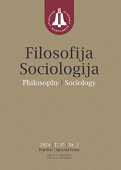Significant Absences: Wittgenstein’s Philosophy of Silence and Joyce’s Poetics of the Unspoken
Significant Absences: Wittgenstein’s Philosophy of Silence and Joyce’s Poetics of the Unspoken
Author(s): Darko Blagojević, Vanja D. Vukićević GarićSubject(s): Studies of Literature, Metaphysics, Philosophy of Language
Published by: Lietuvos mokslų akademijos leidykla
Keywords: Wittgenstein; Joyce; language; reality; silence; narrative absences; metaphysics; poetics;
Summary/Abstract: This paper discusses an important phase in Ludwig Wittgenstein’s analytic philosophy through a comparative examination of the profound correspondences that exist between his concept of silence and the poetics of another crucial authorial figure of the 20th century: James Joyce. Based on the hypothesis that there are striking resemblances between their early works, that is, between Joyce’s realistic short-story collection Dubliners and Wittgenstein’s Tractatus Logico-Philosophicus, the article employs mostly close-reading, analytical-interpretative and comparative methods. It argues that silence was an intentional intellectual, aesthetic and ethical choice of both these authors, their way to preserve the autonomy of metaphysics and to honour the beauty of the unspoken. Starting from their common critical treatment of the habitual and largely alienated speech, the discussion connects Wittgenstein’s philosophical attitudes regarding the imprecision and inadequacy of every-day language and Joyce’s notion of ‘spiritual paralysis’ of the city-life, which he saw as the main motive for writing his collection about fin-desiècle Dublin. On the grounds of their shared views about the limits of words, behind which there are worlds that cannot be properly uttered, the idea of silence – or the highly significant narrative absence – grows to permeate the work of both. In the case of Wittgenstein, it is a call for a new philosophy, or anti-philosophy, which in negating metaphysics in effect preserves its independence from a discursive speech which cannot express it, whereas in the case of Joyce, correspondingly (and almost simultaneously), it is a quest for a new literary mode that will foreground a particular Modernist allusiveness, rhetoric of omission and deliberately incomplete, gnomonical narrative structures.
Journal: Filosofija. Sociologija
- Issue Year: 35/2024
- Issue No: 1
- Page Range: 75-82
- Page Count: 8
- Language: English

